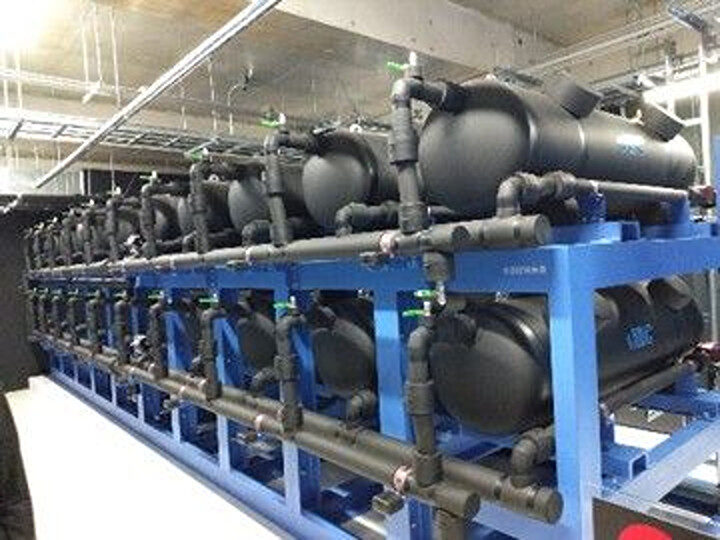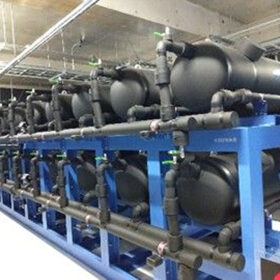pv magazine: Can you discuss Hi Physix’s expansion into solar?
Pankaj Rai: Inspired by India’s clean energy mission to generate electricity from renewable energy sources, mainly via solar energy, Hi Physix Laboratory India Pvt Ltd was established to provide the best quality testing services for almost all solar products, using well-equipped infrastructure, and with the help of highly qualified technical personnel.
Our objective is to support the Indian industry by providing reliable testing services, and to ensure the delivery of quality products to consumers. Our laboratory will be useful for both manufacturers and the Ministry of New and Renewable Energy (MNRE), in ensuring the successful implementation of the Compulsory Registration Scheme (CRS) for PV Modules and Battery Storage for Solar Applications, introduced by the Ministry of New and Renewable Energy (MNRE) and the Bureau of Indian Standards (BIS).
The laboratory, which was inaugurated by the honorable late Dr. A. P. J. Abdul Kalam, the former President of India, has been accredited by the National Accreditation Board for Testing and Calibration Laboratories (NABL) and is also recognized by BIS. We have over a decade of experience in providing testing services to global customers in the fields of Electrical, Electronics and Lighting discipline.
What are the current quality issues in PV modules and batteries? How should they be resolved?
It will be too early for us to comment on the quality issues in modules and batteries, but major problems observed are as follows:
- Non-Conformance to nameplate ratings and tolerances for modules and battery;
- Visual defects in modules – micro-cracks, discoloration of contacts, snail trails, etc.;
- Quality of encapsulation material;
- A significant performance difference reduction after thermal cycling and damp heat test,
- And inaccurate deep cycle ratings specified by manufacturer in case of solar batteries.
In our opinion, better quality of raw material and quality control of the manufacturing process can take care of more than 80% of the issues faced by consumers.
What can Hi Physix offer the Indian PV industry that others can’t?
As of January 23, 2018, we are the only laboratory in India, which is recognized by BIS for the complete testing of all types of solar PV modules, and solar applications, as per the applicable IS/IEC standards; an executive order – Solar Photovoltaics/Systems/Devices/Components and Goods (Requirements for Compulsory Registration) – which was introduced by the MNRE on November 16, 2017.
Hi Physix, recognized by BIS, can undertake tests for the following solar products/standards:
- Crystalline Silicon Terrestrial Photovoltaic (PV) modules – Design Qualification and Type Approval as per IS 14286:2010
- Thin Film Terrestrial Photovoltaic (PV) Modules – Design Qualification and Type Approval as per IS 16077: 2013
- Photovoltaic (PV) Module Safety Qualification Part 1 Requirements for Construction as per IS/IEC 61730 (Part 1): 2004
- Photovoltaic (PV) Module Safety Qualification Part 2 Requirements for Testing as per IS/IEC 61730 (Part 2): 2004
- Secondary Cells and Batteries for Solar Photovoltaic Application General-Requirements and Methods of Test as per IS 16270: 2014
Our laboratory issues test reports after testing products/samples, which are accepted by the CRS for PV Modules and Battery Storage for Solar Applications. We can also test PV modules for performance, durability, safety and compliance with legal regulations; and can critically check PV/solar products against all essential standards, as per customer requirements.
What areas of quality standards require improvement in solar?
None of the standards guarantee 25 years’ life of solar PV modules. It only qualifies that the modules do not have a design flaw, are safe to use, and are likely to survive in the field. For guaranteeing the 25 years’ life, accelerated stress tests must be incorporated in the test flow, in line with the PV durability test initiative suggested by Fraunhofer, Germany.
India is a sub-tropical region, with mostly a hot climate throughout the year. So what are the technical points and issues related to modules, components, and batteries, that should be addressed and taken care by manufacturers?
In case of PV modules, Potential Induced Degradation (PID) failures are commonly observed in the solar plants because of high system voltage, hot climate, and humidity levels. Solar PV manufacturers may improve on the encapsulation quality, i.e., choice of material and thickness of encapsulation material for reducing the PID related field failures.
Regarding solar batteries, thermal management, and associated components become critical. Here also the choice of material, proper dimensional specification need to be controlled by the manufacturer.
Has Hi Physix been accredited by the MNRE? If not, are you planning to do this?
No, we have not yet been accredited by the MNRE. We have, however, already initiated the necessary process for accreditation. We firmly believe that we shall meet all the critical requirements of the MNRE’s National Lab Policy.
Are you obliged to adhere to the National Lab Policy, which the MNRE introduced on September 29, 2017? What are the requirements of the policy?
Yes, we are obliged to adhere to the National Lab Policy and meet all of the mandatory requirements laid out by the MNRE. The critical conditions of the policy are as followed:
- NABL accreditation as per ISO/IEC 17025:2005
- BIS recognition for relevant product/standards
- Traceability for all measurements and test procedures, as per prescribed standards
- Test labs shall store, transport and deploy equipment as per requirements of the accreditation
- Test labs will ensure calibration of their equipment at regular intervals to achieve the specified accuracy and repeatability of the measurements
- The laboratory should have the relevant and adequate workforce for testing and performance certification of products
- All facilities of the laboratories should be available for inspection and scrutiny by MNRE and authorized committee, as and when demanded
- Lab regularly participates in Inter-Laboratory Comparison and Proficiency Testing
- Laboratory information and quality management systems are adequately maintained
India is home to two of the worlds’ biggest testing lab centers, UL and TÜV Rheinland. Other MNRE accredited labs – NISE, ERTL and ETDC – are also active in India. How does Hi Physix differ from them?
(NISE – National Institute of Solar Energy; ERTL – Electronics Regional Test Laboratory; ETDC – Electronic Test and Development Centre)
To the best of our knowledge, the two private laboratories located in Bangalore – UL India Private Limited and TÜV Rhineland – may offer testing services, which meet MNRE’s guidelines. Other MNRE accredited laboratories – NISE, ERTL and ETDC – may also provide testing services for solar energy equipment. However, these laboratories are not sufficient to meet the market requirements for testing and certification of the vast Indian market.
Currently, Hi Physix is the only recognized laboratory, which can offer complete testing for solar PV modules and batteries for solar applications. Very soon, the company will also provide services for charge controller testing and grid-connected inverter testing.
Moreover, we are strategically located in Pune, and have an office and sample collection center in Delhi. It will have better reach and serving capabilities for the pan India market, compared to our competitors.
This content is protected by copyright and may not be reused. If you want to cooperate with us and would like to reuse some of our content, please contact: editors@pv-magazine.com.







I congratulate the entire team of Hi Physics, Pune and Shri Pankaj Rai,CEO in particular for this landmark achievement. This has been possible only because of hard works on war futting, the untiring effort of the team HPLIPL under the dynamic leadership of an young visionist Shri Rai.
I foresee many such achievements in near future and once again kudos to Shri Rai and the team.
It is always great to be reminded of good friends like you. I’m grateful to all people who supported me through the years. Thank you very much for recognising my efforts.
I congratulate the entire team of Hi Physix, Pune and Shri Pankaj Rai,CEO in particular for this landmark achievement…
You guys are a rare bunch because you work just as hard as you party. Thanks for your efforts and kind wishes.
Congratulation to the entire team of Hi Physics, Pune and Shri Pankaj Rai,CEO for making this facility been made available for the solar industry. The National target for 100 GW in solar is on way. We have done with almost 20 GW that is to say 20 % of our ambitious target. A long way still to go. With huge investment coming and to confirm the life span of the product it is very much essential to maintain quality of the product.
Hi Physics through its committment will support in quality mission.
I foresee many such achievements in near future.
I’m grateful to know that you share in my happiness and success. Kindly accept my sincere thanks.
I congratulate entire hi physix team on behalf of “softgrip” group.
We are been continuously using facilities of hi physix in testing of led luminaries.
Co operation of entire team is excellent.we are also venturing in the field of manufacturing PV module in India.
So testing facility and guidance of them will be useful to us.
Best of luck to entire team.
Your congratulations wish warmed my heart. We appreciate your business. Thank you very much for your support and encouragement.
NVS Kumar
I congratulate the entire group of HI Physix laboratory specifically Dr. Chatnis and Sri Pankaj Rai for the outstanding achievement I proud to say that I have an opportunity to audit the laboratory I am really honored.
I wish all the best and many more achievements.
Regards
Your kind and encouraging message has motivated me to do even better than I have done. Thank you for the congratulations.
This is only possible due to the dynamic leadership of CEO shri pankaj Rai and his vision. We know in India that we are always facing the problem of good manager and leadership. If perfect manager and management with vision is there, work can be done by done by any staff.
Complete credit goes to his young and dynamic move and vision.
I congratulate him and our best wishes and cooperation will always be with him.
I feel proud you are an exclusive member of Hi Physix family. Keep rocking as usual.
NVS Kumar
I congratulate the entire group of HI Physix laboratory specifically Dr. Chatnis the Chairman and CEO Sri Pankaj rai for the greatest achivement. I am proud to say that I have an opportunity to audit the laboratory and it’s a great honor to me.
I wish all the best and many more achievements in future.
Regards
Your kind and encouraging message has motivated me to do even better than I have done. Thank you for the congratulations.
Congrats entire team of Hi physix lab for this achievement…
Thanks for your wishes and remembering Hi Physix.
👍👍👍
Thank you very much.
N J Bhat
Mr Rai has added another feather to his cap.He is a man of Action and brings best out of his team. His Scientific temper combined with entrepreneurship has transformed
HI PHYSIX Laboratory in to a full fledged advanced testing Lab. of India. I wish him all the best.
Thank you very much for recognising my efforts and for the warm congratulations wishes. We need your continuous support and blessings to take Hi Physix to next level.
I congratulate the entire team of Hi Physix Laboratory-Pune, specifically Mr. Pankaj Rai Your dedication, enthusiasm and insight are really inspiring and once again you have proved your benchmark leadership and vision turned into reality.
I am so proud of you. 🙂
HPLIPL Rocks!
I heartily thank you for your blessings and congratulatory message. It was all because of the love and support from people like you.
I congratulate Shri Pankaj Rai and his team of HiPhysix for this landmark achievement…
It’s because of support and blessings of well wishers and friends like you. Thank you very much.
Congratulations to entire hi physix team for achieving new task for being the one of the best Indian laboratories.
Your warm wishes always make my heart grow. I feel so blessed to have you as member of Hi Physix family.
Hearty congratulations to Pankaj Rai and team.
Best Wishes
I heartily thank you for your kindness and warm wishes for always supporting and encouraging Hi Physix.
It’s a delight to work with you who knows how to make a friendly and motivating work environment. Your devotion, dynamism and knowledge are extremely inspiring. All the additional hours, all the sacrifices, all the restless evenings and early mornings have at last paid off. A beautiful soul deserves delightful things in life. May the rest of your life be brimming with numerous more success like this one. Wish you many years of great accomplishments. Congratulations Sir and big cheers to Hi Physix!!!!
HEARTY CONGRATULATIONS TO ENTIRE TEAM
Congratulations Pankaj Sir, this is really a great achievement for you and HPLIPL.
Congratulations Pankaj Sir and high Physix team.
Congratulation to the entire team of Hi Physics, Pune and Shri Pankaj Rai Sir CEO for making this facility been made available for the solar industry.
Hi sir .
I am Amit Kumar proprietor of LUMESUN POWER SYSTEM. Just want to know about MNRE approved solar street lights (LM-79,80 and IP65 ). We are manufacturer of solar street lights and LED street lights.
Dear Sir,
Thank you for your valuable enquiry. We have testing facility for all types of photometry product. Our Lab is NABL Accredited and BIS Recognized . Kindly feel free to contact us for any query.
Contact no.+91-7768005400 / 11/22
CONGRATULATION SHRI PANKAJ RAI SAHEB
CREDIT FOR THIS GOES TO YOUR DYNAMIC LEADERSHIP AND YOUR TEAM MEMBERS FROM PUNE LAB PARTICULLARLY SHRI KUNAL SIR.
I MET YOU DURING YOUR SHORT VISIT TO YOU ALSO AND SEEN YOUR DYNAMIC ,MOTIVATING AND INVOLVING EACH TEAM MEMBERS QUALITY FOR ACHEVINIG EXCELLENCE IN YOUR TESTING CALIBRATION FIELD .
BEST OF LUCK FOR FUTURE VENTURE PANKAJJI
N D DESHMUKH
FORMER SC F BIS PUNE